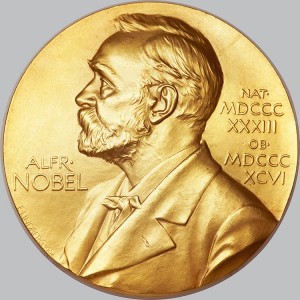Nobel Prize in Medicine Shared by Three Doctors for Work on Parasitic Diseases
Oct. 5, 2015

The Nobel Prize is awarded each year in the categories of physiology and medicine, chemistry, physics, literature, peace, and economics. Winners receive a gold medal, a diploma, and money. (Credit: Nobel Foundation)
Officials at the Nobel Assembly at the Karolinska Institute in Stockholm, Sweden, announced today that three scientists will share the 2015 Nobel Prize in physiology or medicine for discoveries that led to new treatments for parasitic diseases. William C. Campbell, an Irish-born American of Drew University in Madison, New Jersey, and Satoshi Omura of Kitasato University in Tokyo, Japan, will share half of the prize for their research on treatments for roundworm parasites. The Chinese scientist Youyou Tu of the China Academy of Traditional Medicine in Beijing, China, was also honored for her work in developing treatments for malaria.
Working independently, Campbell and Omura studied chemical compounds that are effective against roundworms. At least 14 species of roundworms cause serious infection in millions of humans worldwide. Omura identified certain compounds produced by Streptomyces, a microbe that grows in soil, which acted against bacteria and other infections. In the U.S., Campbell further studied the compounds and found that one component was remarkably efficient in fighting roundworm parasites in animals. The compound, called Avermectin, has been developed into drugs that protect people and animals from a wide variety of diseases caused by roundworm parasites. These diseases include ascariasis, lymphatic filariasis, River blindness, and trichuriasis.
Dr. Tu used her background in Chinese traditional medicine to identify compounds in plants that could be used to treat malaria. Malaria is one of the most widespread and threatening parasitic diseases that affect human beings. The disease is caused by infection with parasites called Plasmodia (in the singular, Plasmodium). They are transmitted to human beings through the bite of the female Anopheles mosquito. Scientists estimate that about 500 million people are infected by malaria parasites and 1 million to 3 million people die from malaria each year.
In the 1980’s, Tu isolated a compound from Artemisia annua, a plant commonly used in traditional herbal medicine. This compound was developed into a drug, called artemesinin, that is highly effective for treating malaria and preventing the development of varieties of Plasmodia that resist the effects of other drugs.
Other World Book articles


